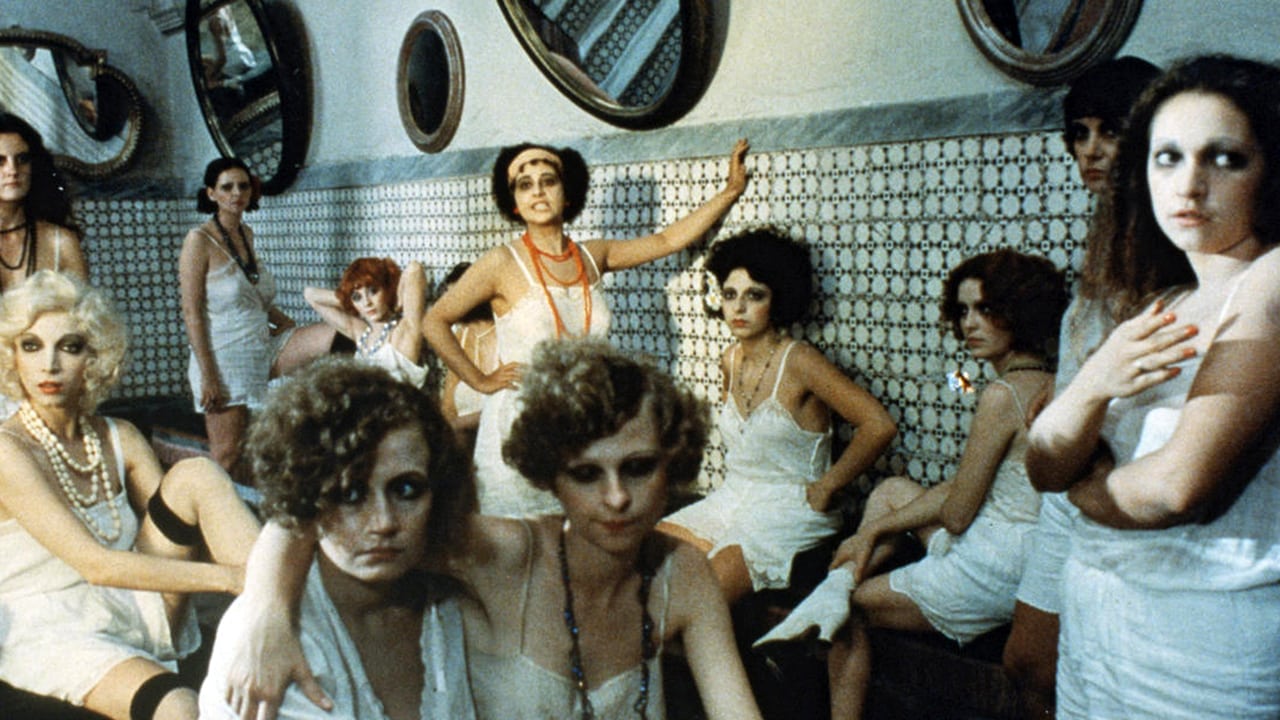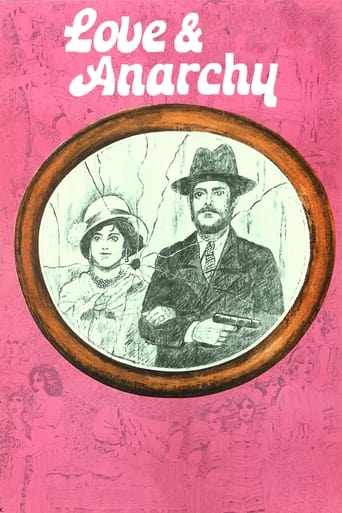

Unshakable, witty and deeply felt, the film will be paying emotional dividends for a long, long time.
... View MoreIf you're interested in the topic at hand, you should just watch it and judge yourself because the reviews have gone very biased by people that didn't even watch it and just hate (or love) the creator. I liked it, it was well written, narrated, and directed and it was about a topic that interests me.
... View MoreThis is a small, humorous movie in some ways, but it has a huge heart. What a nice experience.
... View MoreI enjoyed watching this film and would recommend other to give it a try , (as I am) but this movie, although enjoyable to watch due to the better than average acting fails to add anything new to its storyline that is all too familiar to these types of movies.
... View MoreGiannini at his best , a cult wertmuller movie that has been forgotten but it's a very good movie not only for Italian public but also for cinema lovers of all genres. it's the story of a poor man , Tunin which he must kill Mussolini during a ceremony. So he stayed for a couple of days in a house where there are women that offer sexual lends by paying. Tunin will fall in love with two of them and that will be negative for his mission. The excellent acting and the lina wertmuller's directing made this film a masterpiece and a realistic portrait of Italy of the '30. Giancarlo Giannini and Mariangela Melato are really wonderful and they show that Italian acting is at American level
... View MoreIt's such a shame that Wertmuller no longer commands the interest of producers. She gave us such powerful films, and at her peak, she and Giannini could do no wrong. European directors have given us films that excoriate Fascists. There is Bertoluci's "1900" and "The Conformist"; Costa Gravas's "Missing", there is "Schindler's List","The Pianist", "Two Women" are just a few of a long list. What does Wertmuller show us? Simple people get caught up in every single war, WW 2 was no exception. There were probably all kinds of attempts to kill Mussolini before he was finally caught and hung up like a piece of meat. This movie takes place early in the rise of El Duce. To openly show displeasure with his black shirted thugs would guarantee a short and brutal outcome. The same held true for those brave and furious souls in Spain and Germany who tried (in vain) to stand up against Fascism. The main story in this drama is the almost mad plans of a simple country bumpkin who seeks to avenge the murder of an "anarchist" who planned to kill Mussolini but got carried away and told everyone in the town of his plans. Next thing we see is him murdered. Giannini's character shows up in Rome and seeks refuge in a brothel (all pre-arranged), after having gone to France for training in shooting a gun. Much has been made of the mayhem inside the brothel but to me this is color adding to the texture, it is subtext. The main body of this drama evolves with Tunin and his trembling approach to the plot. That he becomes embroiled in an unexpected love for a prostitute is but one twist in the plot. There are several wonderful scenes where he has ample opportunity to kill a vile fascist thug who is a regular at the brothel but he refuses to get sidetracked. Even after having fallen in love he still refuses to divert from his presumed destiny. He fully expects to either fail or even if successful to get caught and killed for his efforts. "Tunin" tries to make sense of his confused feelings and at the end has to abandon clarity for duty. He is confused, frightened and compelled to honor his fallen comrade. The surprise twist (I won't spoil it) at the end of the film pushes him over the edge into an irrational, spontaneous and self destructive spree. His fate once met is anti=climactic, he having already intuited the end. The film is funny, tense and upsetting. I simply cannot believe how fast Mariangela Melato speaks, she sounds like the fast rattle of a machine gun. The cast is totally wonderful, the direction tight, with evocative single frame shots of Tunin in a pose, creating a "snapshot" feel, supporting his introspection as he plans. (An aside: what is up with Giannini's face? He looks like his face was covered in splotches ...like freckles; he looked sickly and scary and did not look like this in "Swept Away") Anyway, a really powerful drama, the likes of which we just don't see today.
... View MoreRather than contend for film with the longest title, "Film of Love and Anarchy (or At Ten o'clock This Morning in Via dei Fiori in the Infamous House of Prostitution)" is better known by the more manageable "Love and Anarchy". This 1973 Lina Wertmüller thriller is a hard first watch because there is no suspense to grab the viewer and hook them into the story. I was only able to handle about 30 minutes at a time, not because it was unpleasant but because I was too uninvolved in the story to ignore distractions and interruptions. But while it withholds most of its appeal from the initial viewing, it yields something new each time it is viewed."Love and Anarchy" is more an expressionistic opera than a realistic thriller. Imagine "Cabaret" starring Charlie Chaplin's "Little Tramp" and you will have a good idea of its style. It's main theme sneaks up and surprises you. U.S. viewers, dimly aware of the great depression and World War Two, suffer a complete cultural disconnect regarding the continuing legacy of fascism in Italy and Germany. Meaning that anti-fascist political messages are embedded in almost all post-war Italian cinema. But Wertmüller's "Love and Anarchy" has the broader theme of anti-extremism, taking shots at those who make major sacrifices out of perverted idealism and a lack historical perspective. The film begins with its main character Tonino (Giancarlo Giannini) at a turning point in his life, the execution of an older relative for political subversion. After viewing the body on display in what would otherwise by an idyllic rural setting, Torino is inspired to take over what he perceives as his relative's mission, the assassination of Benito Mussolini. Tonino goes to Rome and links up with his anarchist contact, a highly sought after call girl named Salomè (another Wertmuller regular Mariangela Melato), her brothel is popular with the Fascists and Mussolini's head of security, an arrogant blow-hard named Spatoletti (Eros Pagni), is especially fond of Salomè. Tonino and young call girl Tripolina (Lina Polito) soon fall in love which serves to greatly complicate his mission.I watched the widescreen version of the film on the Fox Lorber DVD, and contrary to several other comments I found no problems with the film transfer. My guess is that these refer to the variation in color tone as the film cuts between characters, but this is a deliberate effect by Wertmüller's. She lights each face differently to convey the character's motivation. The uncomplicated Torino is given natural lighting, the political Salomè is tinted red, and the disillusioned Tripolina is in shadow. These combine with bold colors, a surreal score, and acute camera angles that exaggerate elements and play with scale in many of the frames. The everyday scenes in the brothel are especially good, combining the audacious with the darkly comic. The best is a carnival-like montage to music showcasing the start of a busy day of business for the prostitutes and their eager customers. In almost any other film Pagni would steal the whole thing with his overplayed performance but Melato matches him line for line. This contrasts nicely with the more subtle and nuanced performances of Giannini and Polito. Polito is very effective when Wertmüller makes use of her eyes in several close-ups.There is much overwrought melodrama as Wertmüller uses a farcical tone to illustrate that the Fascists and their opposition are linked by a common hypocrisy and a shared perversion of idealism. Ironically the film is at its best during its quiet scenes such as Tornio and Tripolina's stroll through the plazas of the city. This is an important film with an original message, fine performances from the entire ensemble, and really slick film-making techniques.Then again, what do I know? I'm only a child.
... View MoreI loved, loved, loved this film. This is Wertmuller's best film in my opinion.SPOILERS Tunin is a poor farmer from the south who decides he must take over the role of Mussolini's assassin after his older, anarchist friend is killed by the fascists in his attempt to assassinate Mussolini.Tunin meets his conspiratorial contact in a brothel, where she works undercover, so to speak. He also meets another prostitute with whom he falls in love. Wertmuller does a very good job with the romantic storyline as well.Although Tunin's first reason for assassinating Mussolini was that he "hates tyrants," he also was doing it to get revenge for his friend, but also he hoped that in this act he would "beome" someone. This story had a more universal theme of how people try to become "someone" when they feel like a "no one," and it also makes you wonder how many people there are that were like Tunin, trying to change things and failing to the point that no one even knew they had tried in the first place. Sadly, in the end, Tunin remains an unknown, and it is so sad, yet the ending is so well done, and I really think the original title is much more powerful than just "Love and Anarchy" because of the ending. At 10 o'clock in the morning, in via dei Fiori, in a well-known brothel... he is no one. I love Giancarlo Giannini, and he does a really good job in this film playing a different character than his usual Wertmuller characters.
... View More